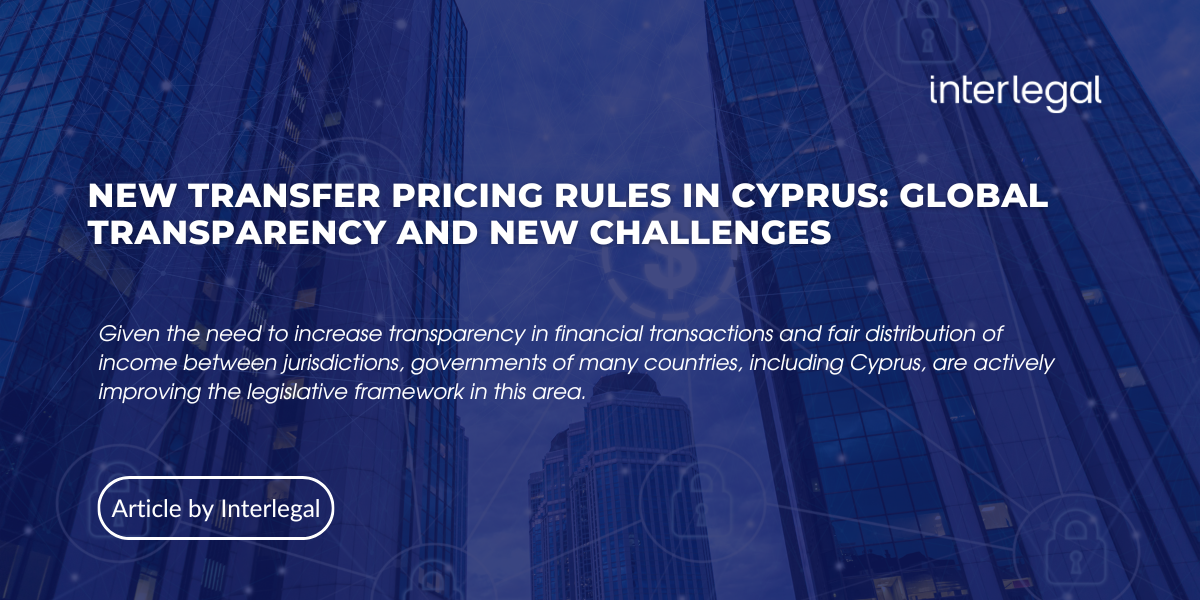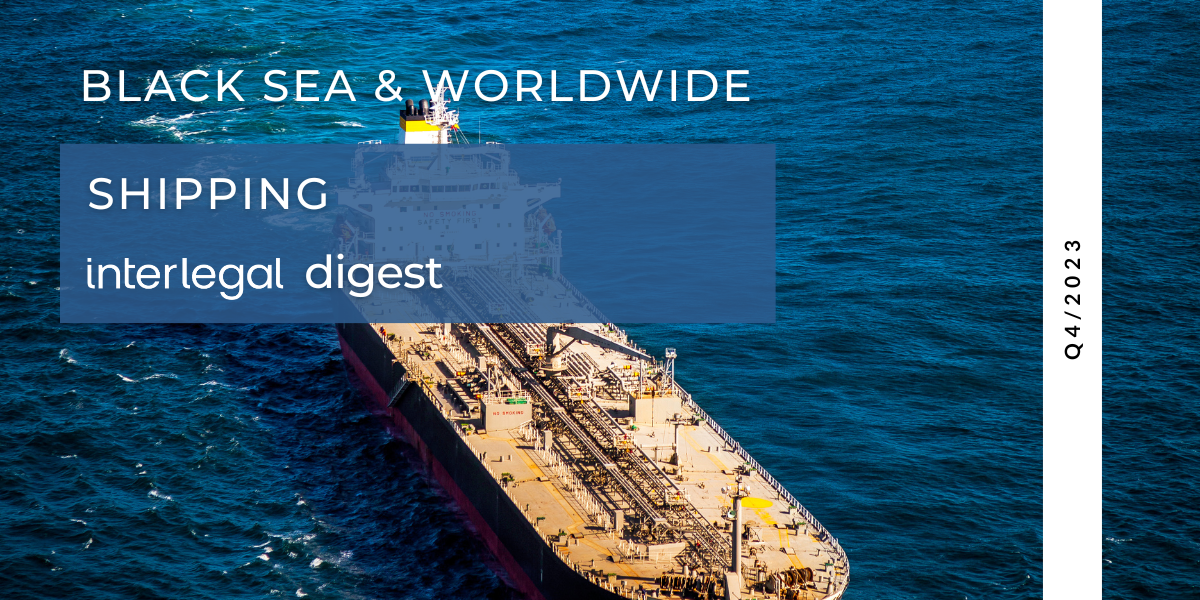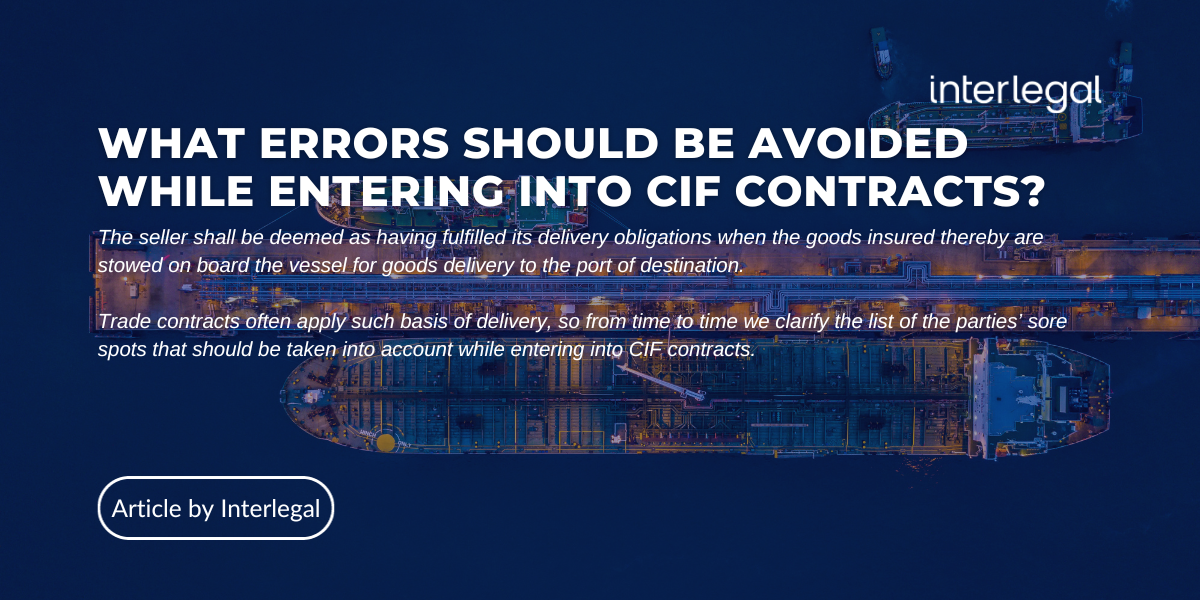Quarterly Shipping Newsletter by Interlegal – Q1-2021
5 February, 2021
3

Dear colleagues,
Here is Quarterly Shipping newsletter broght to you by Interlegal. Let us present the most valuable cases and news, selected by our lawyers recently.
UN Judicial Sale of Ships Convention
At the 35th session of the UN Commission on International Trade Law in 2017 the International Maritime Committee (CMI) proposed to work on cross-border issues related to the judicial sale of ships. The CMI in its proposal outlined the significant issue to recognize the clean title acquired by the purchaser under the law of the State of sale, lack of which can lead to the subsequent arrest of the ship for presale claims. Consequently, an International Working Group, consulted by the various national maritime law associations prepared The Beijing Draft.
The issue is of crucial importance for everyone willing to acquire a ship through judicial sale auction, as far as in the majority of cases the ships’ sale is the result of successful enforcement of maritime or other claims against the ship and her owner. Thus, every person purchasing such ship is exposed to risk that the ship may be further arrested for previously existed debts and the burden of settling this claim or disputing it at the court would lay on the innocent purchaser.
The UNCITRAL held its 37th session on 14-18 December 2020 where it has revised the last edition of the Beijing Draft and provided marine community with information of further planned development in the subject matter. The State Parties to this Convention agreed on the following important points:
- Recognising that the judicial sale of ships is maintained as an effective way of securing and enforcing maritime claims and the enforcement of judgments or arbitral awards or other enforceable documents against the owners of ships.
- Convinced that necessary and sufficient protection should be provided to purchasers of ships at judicial sales.
- Considering that once a ship is sold by way of a judicial sale, the ship should in principle no longer be subject to arrest for any claim arising prior to its judicial sale.
- Considering further that the objective of recognition of the judicial sale of ships requires that uniform rules are adopted with regard to the notice to be given of the judicial sale.
We will be further monitoring the situation and development around the Beijing Draft as there are two more planned sessions of the UNCITRAL for 2021 year what shows us that there is a significant interest and intention of all involved parties to pass this Convention.
Time charter case: Consumption warranty, rescission and affirmation issues
In the recent case of SK Shipping Europe PLC v. Capital VLCC Corp and Capital Maritime and Trading Corp (the “C Challenger”) Mr. Justice Foxton have considered the dispute between the owners of m/v “C Challenger” and their time charterers.
Along with the points directly related to the common time charter issues, namely consumption warranty, the High Court also significantly developed the clarifications for general rules of contracts execution.
The background of the case was the following:
Within November 2016 the owners decided to charter out the vessel, C Challenger, for time charter. They further entered into negotiations with Capital VLCC for a potential charter of the vessel. Shortly thereafter, a two-year time charter was agreed by the parties, in which a warranty regarding the vessel’s bunker consumption was provided.
The vessel was chartered out in February 2017. During the charter period, the vessel over-consumed bunkers comparing to the warranted suggestions. This resulted in the charterers’ allegation that the owners had misrepresented the vessel’s performance capabilities. The charterers consequentially attempted to rescind the charter for misrepresentation or alternatively to terminate the charter for repudiatory breach. In turn, the owners alleged that the charterers by their conduct breached the charter by way of early termination and sought the respective damages.
Within more than 100 pages award the judge has outlined some prominent issues, which are vital for further understanding of the contract performance and may be summarized as follows:
1. Even though after the charterers found out that warranted fuel consumption was significantly exceeded, they performed all their actions on “reservation of rights” basis and relied on that in their attempt to rescind of the contract, the judge held that the charterers’ conduct (continuation of the charter performance even on without prejudice basis) was in fact an affirmation of contract, thus the right to rescind was waved by the charterers.
2. The approved fact of the vessel’s underperformance in respect of fuel consumption did not constitute a repudiatory breach of the charter by the owners, as far as such breach of warranty did not deprive the charterer of substantially the whole benefit which it was intended to obtain under the charterparty for the payment of hire, or “go to the root” of the charterparty. Therefore, fuel consumption terms entitled the charterers to claim damages, but not to terminate the contract.
3. The charterers, believing in their right to rescind the contract, notified the owners of their intention. As far as their belief appeared to be premature and in fact there was not a right to terminate, the charterers appeared to be in breach themselves and, therefore, the owners were entitled to claim damages for early termination of the charter party by the charterers.
There have been much more interesting findings in the judgement, which are of utmost importance for the determination of the parties’ rights and obligations under the chartering contracts.
Owner’s Responsibilities clarified in new GENCON charter
The BIMCO working team who is responsible for drafting documents is currently developing one of the most used in Black Sea region standard Charter Party, which is Gencon 94.
The working team started with and has recently agreed on a new Clause 2 concerning shipowners’ responsibilities. The new clause will offer a more flexible and balanced approach. To be more precise, shipowners now have a due diligence obligation to provide a cargoworthy vessel at the beginning of loading and a seaworthy vessel at the beginning of voyage. In contrast, the Hague-Visby Rules provide that “before and at the beginning of the voyage” obligation which results in ambiguity. As a result of the new Clause, there will be more certainty regarding which points in time the shipowners’ obligations relate to.
Of course, English law which governs the Gencon by default has developed a significant pool of clarifications in this respect and the relevant authorities already distinguish the owner’s responsibilities depending on the stage of the voyage performance, but for the ease of reference and convenient use by all the industry participants it would be much reasonable to outline this commonly established approach in the express term of the standard charter party provision.
With the new Clause 2, GENCON user will get more precise understanding of shipowners’ responsibilities which are to be modified in comparison to the Hague-Visby and would offer more familiarity.
New charter of GENCON is likely to be presented for adoption in May 2021, so we will keep an eye on this process to keep our clients properly updated.
OUR RECENT CASES & ARTICLES
QUALITY FINALITY AT THE LOADING PLACE: ENGLISH LAW APPROACH
In accordance with international practice, most contracts on sale and purchase of raw commodities are governed by English law. To a large extent, it applies to contracts whereunder Ukrainian agricultural products are exported to foreign markets, in particular to China. READ MORE >>
Interlegal assistance in drafting agreement between the Shipowner and the Fleet Manager
The Client – fleet manager – applied to Interlegal for drafting a dispute settlement agreement with the Shipowner, in order to optimize their further joint business. READ MORE >>
Interlegal lawyers won the case in London
The Client – Ukrainian company engaged in design and engineering works for foreign firms – applied to Interlegal, due to non-payment by the Customer (a large UAE company) for already completed orders and payment delays. READ MORE >>
Ship release in Belgium
The client – owner of the vessel detained by Port State Control at one of the Belgian Ports, applied to Interlegal for vessel release as soon as possible. READ MORE >>

























































